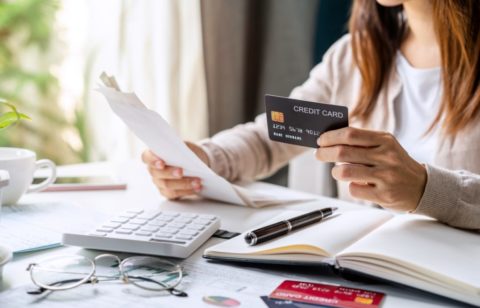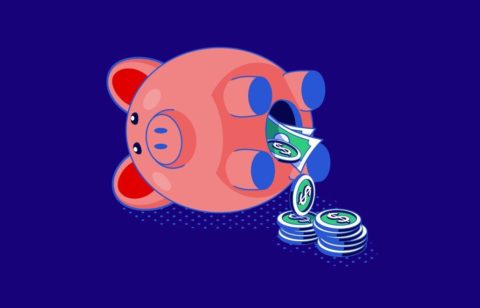According to WalletHub, the average U.S. household has over $140,000 in debt. That may seem like a lot, but it’s actually very common to have that much debt if you have a mortgage, student loans, car loans and credit cards.
If you’re feeling overwhelmed by the money you owe, debt consolidation may be a great tool to get your finances back on track. But before you get started, we recommend taking some time to understand what debt consolidation is, what it isn’t and whether or not it’s right for you.
What is debt consolidation?
Debt consolidation is a term for when you restructure—or consolidate—your multiple credit accounts so that you’re only responsible for making one monthly payment.
The Difference Between a Debt Consolidation Loan and a Debt Consolidation Program
- A debt consolidation loanis a new loan that you take out to pay off all of your other debts. When paying back a debt consolidation loan, you will also typically owe interest.
- A debt consolidation programusually involves working with a credit counselor who will work with your creditors to put together a plan that will make your monthly payments and interest rates fit your budget.
When I consolidate my debt, where does it go?
It’s important to remember that when you consolidate your debts, they don’t go away—they’re simply combined into a loan that’s designed to be more budget friendly for you. For example, you may be able to get a longer loan term that offers lower monthly payments. There are also debt consolidation loan options with shorter terms to reduce the amount of interest you would owe.
The Costs of Debt Consolidation
When you choose to consolidate your debt, it will come with additional costs. Understanding them can help you create a strategy to pay off it off for the least amount of extra money. Here are a few things to keep in mind:
A Lower Interest Rate on a Debt Consolidation Loan May Increase
A good example of this is a credit card that offers a low interest rate or even 0% interest on balance transfers for a limited time. After the introductory rate expires, your credit card company will most likely increase the interest rate to a new, much higher, one.
If you think you’ll be able to pay off the balance of your credit card before the introductory rate expires, this may be an excellent way to consolidate your credit card debt. But if you don’t, consider looking at other debt consolidation solutions.
Consolidating Your Debt Doesn’t Always Mean You’ll Have Lower Monthly Payments
One of the biggest myths about debt consolidation is that it will automatically lower your monthly payments. In fact, your monthly payments may increase—but this may be for a shorter period of time and with less interest than you would have had with multiple bills.
Debt Management Companies May Charge Fees
Before you choose a debt consolidation or management company, do some research to make sure that you fully understand their fees so you can choose the right one to fit your budget.
Four Things to Know When Consolidating Your Debt on a Balance Transfer Credit Card
There May Be a Balance Transfer Fee
Most balance transfer credit cards charge an initial fee, which is typically a percentage of the amount you transfer. The fee may vary from card to card, so make sure to [MB1] read the terms and conditions carefully before getting started.
If You Miss A Payment You May Lose Your Low-Interest Rate
Sometimes even a small mistake like a late payment may mean you lose the low-interest rate you received when you signed up for the credit card—so it’s important to understand the [MB2] details and make your payments on time.
It May Not Offer the Low Introductory Rate on New Purchases
Balance transfer credit cards are primarily for paying off your existing debt, so if you make any new purchases on it, you may not get the special low-interest rate. When in doubt, try paying off your new balance in full.
You May Be Able To Transfer Other Debts to a Balance Transfer Credit Card
Balance transfer cards aren’t just for credit card debt. You can also use them to pay off other types of debt, like personal loans and auto loans. If you find a balance transfer credit card with a low interest rate that lasts for a long time, it may be a great solution for you.
What to Remember When Getting a Loan to Consolidate Your Debt
With a Debt Consolidation Loan, You Get New Terms and a New Lender
If you have multiple debts across various loans and credit cards, each one of them has different terms, interest rates and lenders. Getting a debt consolidation loan allows you to select a new lender and possibly even negotiate new, better terms and lower interest rates than you had before.
Your Payment Will Be a Consistent Amount Each Month
If you get a fixed-rate debt consolidation loan, your payment will be the same each month. Having a consistent amount due each month makes it easier for you to budget your money.
You May Not Receive the Low-Interest Rate You Saw Advertised
The interest rate you receive in your loan will depend on several factors and may not be the same as what you saw advertised. Make sure to review all the details carefully before signing up.
If you would like to learn more about debt consolidation or need help taking control of your debt, visit National Debt Relief or call 800-300-9550 for a free initial consultation. Our Debt Specialists are here to help you find the solution that fits your needs and guide you through the process.







